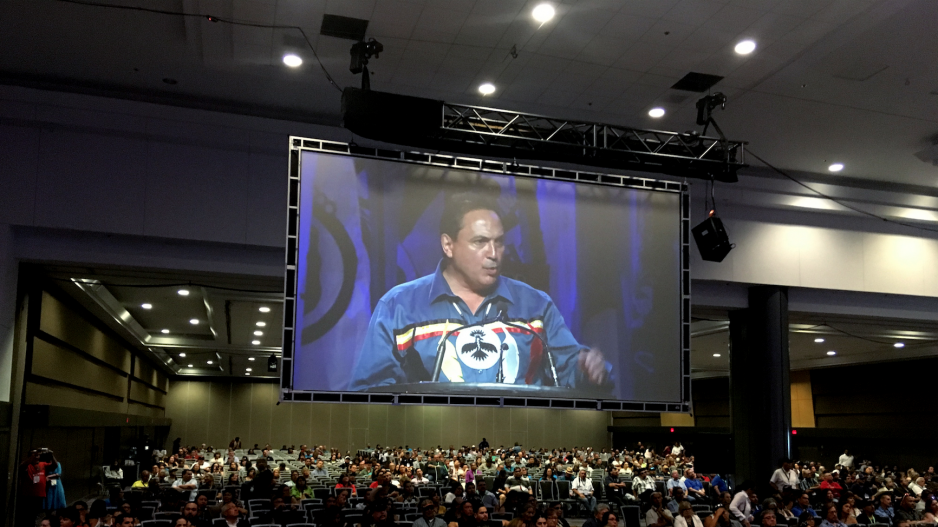Canada’s relationship with indigenous peoples and eschewing the status quo have emerged as key themes among the candidates campaigning to lead the Assembly of First Nations (AFN).
“The government is looking for the status quo. And if you vote for a status quo candidate, there’s going to be repercussions,” said candidate Russell Diabo, a recognized indigenous policy analyst and a member of the Mohawk Nation.
“We need to assert our jurisdiction. We need to change our thinking on getting out of the Indian Act box.”
On Tuesday, five candidates addressed hundreds of First Nations leaders who have gathered in Vancouver for the 39th annual general assembly of the AFN, which represents more than 900,000 people living in 634 First Nation communities, and lobbies government on issues of importance to First Nations, from land rights and reconciliation, to economic self-determination and infrastructure funding.
{"preview_thumbnail":"/sites/default/files/styles/video_embed_wysiwyg_preview/public/video_thumbnails/tKjFuiXiCfU.jpg?itok=W8_KjHu2","video_url":"https://youtu.be/tKjFuiXiCfU","settings":{"responsive":1,"width":"854","height":"480","autoplay":1},"settings_summary":["Embedded Video (Responsive, autoplaying)."]}
Chiefs or proxies will decide this week who will lead the country’s most influential indigenous advocacy organization for the next three years.
“We are at a crossroads,” said Miles Richardson, a Haida Nation member and the only candidate from B.C. He has been endorsed by three former national chiefs.
“We can choose to try to fix, to make incremental improvements to the colonial Indian Act system that has guided our lives for too long. I’m here to tell you that that is a dead-end street.”
Even incumbent national chief Perry Bellegarde, who faced criticism during the campaign for working too closely with the Trudeau government during his first term, argued that mutual respect at the nation-to-nation level needs to be honoured.
“That’s not what we see today,” he said. “Yes, that $17 billion is there but that’s not enough. We know that. We know that,” said Bellegarde, referencing the amount of funds committed over seven years by the federal government since 2015. Bellegarde received widespread applause several times during what was an impassioned speech.
“I’ve heard a lot of talk about money, but it’s never going to close the gap,” argued candidate Katherine Whitecloud, a former AFN regional chief for Manitoba.
The answer, she says, is in nations taking responsibility for their land, and she urged First Nations leaders to not let Ottawa dictate what they can and cannot do.
Whitecloud is one of two female candidates who, if elected, would become the first female leader of the AFN.
The other is Sheila North, grand chief of political advocacy organization Manitoba Keewatinowi Okimakanak.
"It is time for Canada to listen to your concerns around development, without telling you what to do," said North, specifying that she believes it is time for all First Nations in B.C. to be properly involved in development projects on their lands.
"The status quo is not working," she said. "We need a national chief who can sit at the table with the Liberals, without becoming one.”
The event on Tuesday marked the final all-candidates forum of the campaign. On Wednesday, AFN members will vote to re-elect Bellegarde for a second term, or will vote in a new leader.




